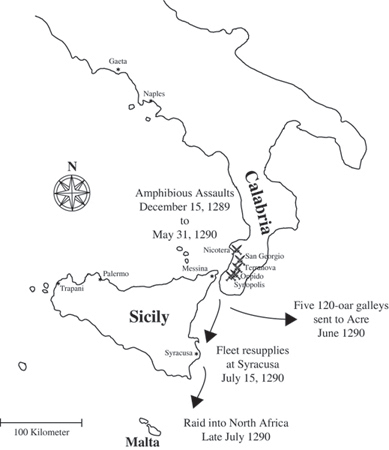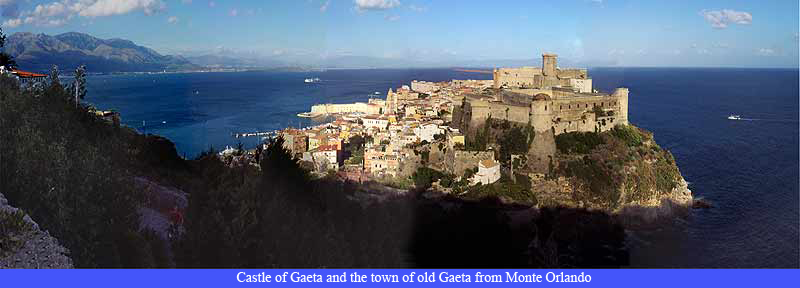Using the opposition of Phillip IV and the pope as an excuse to ignore the Treaty of Canfranc, Charles of Salerno went to Naples and was crowned the King of Sicily, an act that only hardened the position of both Alfonso III and King James of Sicily. In retaliation, Alfonso renewed his campaign in Italy. By the spring of 1289 the towns of Scalea and Policastro had been seized, but the Aragonese had been stopped at that point. In an attempt to draw Angevin units north, Alfonso, with Roger of Lauria, laid siege to the town of Gaeta north of Naples. Alfonso and Roger had apparently been led to believe that the town would revolt and the siege would be a quick one. Instead the town resisted and the siege dragged on long enough to allow Count Robert of Artois to bring an army from the south. The town is located at the end of a thin peninsula and Robert was able to trap the Aragonese between him on Monte Orlando and the town (photo above of old Gaeta from Monte Orlando). The Aragonese forces were trapped uncomfortably close to both the castle and Monte Orlando. However, the fleet controlled the waters around the city and was able to resupply the Aragonese army at will. Both parties settled down to what appeared to be a very long double siege.

During the siege, the camp of King Alfonso was being harassed by stones from trebuchets in the city, which led to a gruesome incident. Roger de Sangeneto had been captured earlier by King Alfonso and to obtain his release he paid homage and promised to turn over the city of Gaeta to the king. As security of his promise he had given his two sons as hostages. However, after his release he reneged on his promise, despite the king still having his sons. To stop the attacks on his camp, one of the two sons of the lord of the city was brought out by the king, at Roger de Lauria's urging, and placed in a cage in front of the king's tent. His father, after deciding that by withholding fire he would dishonor himself, continued to fire at the camp which eventually resulted in his son being struck and killed by one of the missiles. Roger was roundly condemned for this suggestion by the chronicler Speciale, who had taken a dislike to Roger.
However, this incident seems to have motivated Charles II, whose sons were still hostage of the Aragonese. Under medieval law, the lives of Charles's three sons were forfeit the moment he broke the Treaty of Canfranc. He might have thought Alfonso and Roger would not dare harm his sons, but this incident obviously gave him cause for reflection. Charles, fearing for his sons' lives, went to Gaeta and against papal objections signed a two-year truce with Alfonso, which did not include King James of Sicily. On the face of it, the treaty gave the Angevins respite from the blockade of Naples and attacks in Calabria. It has been argued that this effectively separated Alfonso from the Sicilian conflict, but one would not know it from what happened next.
Despite the truce, starting in December 1289 and running through May 1290 the fleet started a series of raids and sieges that took back a good portion of Calabria, including Nicotera. Moreover, the agreement to leave the Angevin shipping alone appears for the most part to have been ignored. It was obvious that the fleet in Sicily was effectively dealing with the Angevins both on land and sea. The realization that King James of Sicily could probably defeat any forces sent against him and the political situation at home led Alfonso to launch a flurry of diplomatic maneuvering in which he tried to soften the position of the papacy by sending five galleys to support Acre in June 1290. While ostensibly sent to support the crusaders at Acre, the squadron did not pass up the opportunity to do some raiding in the Levant before returning to Messina in October. Alfonso III also tried to improve his position in North Africa by reinstalling the former ruler of Tripoli with the help of Roger and the fleet. The fleet sailed in July 1290 for Tripoli but after a short siege the parties began to fall out and the project was abandoned. Roger of Lauria went on to raid the city of Tolmetta before returning to Sicily.



